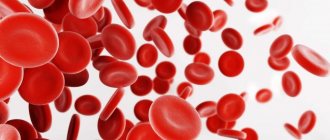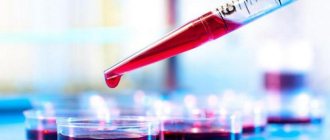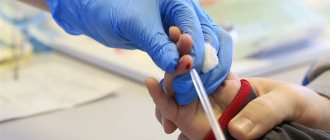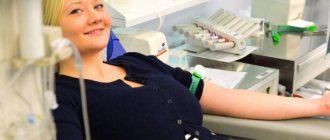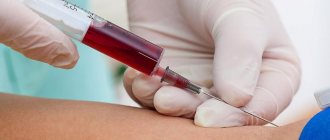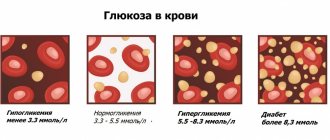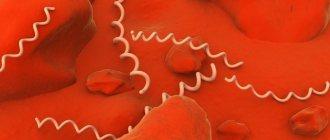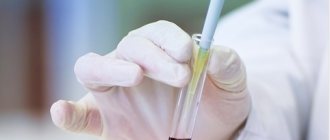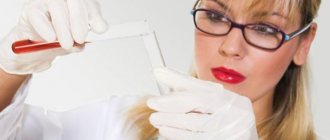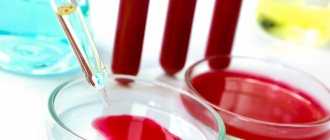Attention!
The information in the article is for reference only and cannot be used for self-diagnosis or self-medication. To decipher the test results, contact a specialist.
A TSH (thyroid-stimulating hormone, thyrotropin) test is a laboratory test that measures the level of this hormone in the blood. Its result makes it possible to assess the quality of the thyroid gland. Most often, doctors conduct diagnostic tests to identify hypothyroidism and thyrotoxicosis. TSH is produced by the pituitary gland.
Thyrotropin is
Thyrotropin is a substance produced by cells in the anterior pituitary gland. It activates the production and release into the blood of these hormones produced by the thyroid gland. The hormone triggers the growth of thyroid cells and accelerates their division. The formation of TSH is triggered by the thyrotropin-releasing factor of the hypothalamus.
This process occurs when the level of hormones circulating in the blood decreases. TSH has an inverse logarithmic relationship with the T4 content in the blood. When T4 production levels increase, TSH decreases. And if the concentration of T4 decreases, TSH production increases.
This mechanism maintains the constant content of hormones at the required level. TSH secretion is regulated by neuronal mechanisms. Its speed changes during sleep, with a decrease in temperature, and nonspecific stress.
For TSH, daily changes in concentration are typical. The highest blood TSH values are achieved between 2 and 4 am. This level remains at these values from 6 to 8 am. The minimum TSH content is recorded at 17-18 hours.
The normal rhythm of TSH production and release during wakefulness at night is disrupted. Pathologies of the thyroid gland lead to a decrease in the level of thyroid hormones in hypothyroidism or to their excess content in the blood in hyperthyroidism.
The hormone stimulates the functioning of thyroid cells. This organ is located on the front of the neck and has the shape of a butterfly. Glandular tissue produces hormones that regulate most body functions. The most important among them are metabolism, body temperature, and heart rate.
The hormone TSH regulates the production of thyroid hormones by cells through a feedback mechanism. When T4 and T3 levels decrease, the pituitary gland produces more of the hormone. This way it stimulates the thyroid cells. With a high content of these substances, the pituitary gland reduces the intensity of TSH synthesis.
This mechanism maintains a constant level of thyroid hormones, as well as metabolic stability. When connections between the thyroid gland, hypothalamus and pituitary gland are disrupted, the functioning of the endocrine glands is disrupted. Situations arise when, with high levels of T3 and T4, thyroid-stimulating hormone continues to increase.
Thyroid-stimulating hormone activates blood supply to thyroid tissue. Iodine, which its cells need to function, is more actively absorbed. This element increases the production of thyroglobulin, triiodothyronine, thyroxine.
They are responsible for the metabolism of nutrients (proteins, fats, carbohydrates) in the body. Hormones also determine the functioning of the digestive and reproductive systems. The functioning of the circulatory system and higher nervous activity depend on them. Both deficiency and excess of TSH, as well as the level of thyroid hormones, affect the condition of the human body.
Iodine deficiency, Selenium
We (Russians) live in a region of iodine deficiency and the thyroid gland is obliged to respond to this deficiency
. That is, if the factory producing the hormone receives little iodine, then the factory can increase its capacity, and accordingly, an increase effect appears, which we call a goiter. In itself, the lack of iodine intake and the microelement Selenium necessary for it can lead to low synthesis of the thyroid hormone levothyroxine.
Indications for taking a TSH test
TSH testing is considered one of the most important in the hormone diagnostic program. Often the analysis is prescribed simultaneously with the T3 and T4 hormones. Indications for the purpose of the study are as follows:
- suspicion of thyroid disease;
- reproductive disorder;
- infertility;
- the presence of anovulatory cycles;
- absence of menstruation;
- an increase in the size of the thyroid gland;
- suspicion of diffuse or nodular goiter;
- manifestations of hypothyroidism;
- presence of clinical signs of thyrotoxicosis;
- poor weight gain in children;
- delayed mental and physical development in children.
- heart rhythm disturbance;
- baldness;
- insomnia;
- trembling in hands;
- decreased sexual desire;
- persistent diarrhea;
- dry skin;
- exophthalmos;
- decreased cold tolerance;
- swelling of the eyelids;
- impotence;
- constipation;
- premature sexual development.
The study is carried out to monitor the treatment of infertility and thyroid pathologies.
A blood test for hormones is not enough
In order to make a correct diagnosis, the doctor determines the level of damage. Not always the indicators that we can see in the blood can answer what level of damage, what is the low level of the thyroid gland, and where exactly is it reduced: at the level of the pituitary gland, or the problem lies in the hypothalamus
.
When can you make a diagnosis of hypothyroidism, and what complaints can you suspect it in your loved ones? With low thyroid function, swelling, a rough voice are more common, there is an increase in cholesterol, and the presence of fluid in the pericardium. These are common symptoms
, but they do not always combine to make a diagnosis of hypothyroidism without the help of a specialist. Sometimes we can talk about the camouflage of the diagnosis: when, depending on the symptoms, a person chooses which specialist to contact. For example, with dry skin, the patient turns to a dermatologist, with constipation, with a gastroenterologist, with a bad mood, with a neurologist, with swelling, cardiac disorders, with a cardiologist, but upon examination by these specialists, it turns out that the patient needs to see an endocrinologist.
Preparation for the procedure
On the eve of the test for the TSH hormone in the blood, the patient is advised to be careful when taking medications and vitamin complexes containing iodine. It distorts the results of the analysis. Doctors recommend stopping taking medications that inhibit the formation of hormones two weeks before testing for hormones.
If for some reason this cannot be done, notify the laboratory assistant about the drugs used. In order for the analysis result to be reliable, preparations for it begin three days in advance. To obtain correct testing data, it is recommended to do the following:
- refusal of alcohol and soda;
- diet excluding fatty, spicy and fried foods;
- smoking restrictions;
- elimination of psycho-emotional stress;
- abstinence from sports and physical labor;
- you cannot have dinner later than 20.00;
- exclude other medical procedures (intravenous, intramuscular injections, massage);
- avoid diagnostic procedures (fluoroscopy, ultrasonography) the day before;
- cancellation of physiotherapeutic procedures.
Take a blood test for TSH on an empty stomach. You are allowed to drink a glass of still water.
Sign up for an examination with a discount:
— The patient was diagnosed with hypothyroidism. Tests: TSH was 6, T4 – 0.9, prolactin increased to 26. Compensated with eutyrox. TSH is now 2.6, prolactin is elevated. There are multifollicular ovaries, the cycle is extended to 34-38 days, pregnancy is planned. How long will it take for the cycle to recover? Do I need to take medications to lower prolactin? All other hormones are within normal limits.
The absence of a program under the supervision of a gynecologist is clearly visible here. In this case, the prolactin problem lies in the ovaries. Therefore, to manage pregnancy, you need to contact a gynecologist and follow the protocol.
— Mom has hyperthyroidism along with nodes, and there is also a feeling of suffocation. An operation was scheduled. What complications can there be?
In order to prescribe surgery to a person, there are certain criteria. First of all, these are growing and changing nodes. To make a decision about surgery, all studies of the nodular formation must be performed: ultrasound, hormones, sometimes thyroid scintigraphy, puncture biopsy of the thyroid gland.
— A 53-year-old patient has hypothyroidism for 10 years, thyroxine 125, fell ill after stress. What are the forecasts?
There is an option to reduce the activity of the thyroid gland, because... The need for thyroid hormones decreases over time. Therefore, the dosage may be reduced over time. Therefore, I advise you to monitor your hormones with an endocrinologist.
— The patient is planning a pregnancy, TSH is 2.9. They prescribed eutirox, decreased to 0.6, reduced the dosage to 25, increased again to 3.2, increased to 50. Are there other methods of influence?
No, there are no other methods, but the step for selecting the drug should be reduced to 12.5.
— How to correctly test TSH free, T4 free, T3 free? Should I take eutirox before the test or after the tests?
Eutirox should be taken after the test. In order to pass the test correctly, you need to understand the rhythm of the thyroid gland: it is most active from 3 am to 2-3 pm. The optimal level of activity can be estimated at 9 am. Blood must be donated on an empty stomach; it is acceptable to take a small amount of water.
— The patient’s antibodies to TPO are elevated, 39 when the norm is up to 9. The endocrinologist prescribed iodomarin, TSH is almost on the verge. Go to another doctor? I'm getting ready for cryotransfer.
TSH should be 2.5 or lower. Ask this question, taking into account the protocol standards, to your gynecologist.
At the end of our conversation, I would like to draw the attention of patients to the fact that all decisions should always be made together with a medical specialist.
What may affect the results
Before performing a TSH test, the patient is advised to exclude exposure to factors that could affect the test result or seriously complicate its interpretation. These include the following:
- Hormonal drugs that affect TSH levels. The system of connections in the thyroid-pituitary gland system is affected by medications for six weeks. Thyrotropin levels are monitored only for two months after adjustment of hormonal medications.
- Medicines. A wide range of drugs leads to an increase in concentration: Amiodarone, Atenolol Motilium and many others. Before donating blood for TSH, you should discuss with your doctor the list of medications that you take regularly. If possible, he will suggest you temporarily stop taking them.
- Severe stress. When a patient is in a long-term unresolved stressful situation or experiencing a short-term severe stressful situation can lead to variations in the concentration of thyrotropin.
- Physical exercise. Heavy physical work or high load during sports training significantly changes TSH levels.
- Infectious diseases. If you have recently suffered from an infectious pathology that significantly changes the concentration of thyroid-stimulating hormone, warn medical personnel about this.
- Times of Day. The level of TSH in the blood varies significantly throughout the day. Therefore, monitoring of this indicator is always carried out at the same time of day.
- Pregnancy. The content of thyrotropin increases significantly in the third trimester of pregnancy.
When the purpose of the analysis is to monitor the ongoing therapy for thyroid diseases, the day before the diagnostic procedures, the medication is stopped.
Hypothyroidism and hyperthyroidism
When we talk about the thyroid gland, the fundamental interest is associated with certain terms that denote its features: hypothyroidism
indicates low function, and
hyperthyroidism
indicates high function. In addition, I would like to draw attention to the peculiarities of our national food: the fact is that in most areas we eat cruciferous vegetables: cabbage, radishes and other products that have an effect on the synthesis inside the thyroid gland; they can sometimes interfere with the conversion of iodine into the hormone. We call this sporadic goiter, and this also needs to be taken into account when we talk about thyroid diseases.
Now let's move on to the issue of low thyroid activity. When might it happen?
Low activity can occur when there is a shortage of supply, when surgery is performed, in cases where a person has received therapy that blocks increased thyroid function - i.e. when taking thyreostatics, as well as in cases where a treatment method called radioactive iodine is used.
TSH norm
Normal TSH levels change with age. Its values may vary among pregnant women.
| Age | Norm TSH µIU/ml |
| newborn | 1,1-17,0 |
| up to 2.5 months | 0,6-10,0 |
| from 2.5 to 14 months | 0,4-7,0 |
| from 14 months to 5 years | 0,4-6,0 |
| from 5 to 14 years | 0,4-5,0 |
| over 14 years old | 0,4-4,0 |
| over 50 years old | 0,27-4,2 |
In pregnant women, the TSH level in the analysis ranges from 0.2 to 3.5 μIU/ml
Thyroid and pregnancy
It is important to know the function of the thyroid gland during pregnancy, when planning it, and when a woman is ready for childbirth. This is due to the fact that low activity of the thyroid gland itself leads to various issues during pregnancy, problems with the child, so there is a consensus on the management of pregnant women, as well as an indicator that should be achieved when planning and managing pregnancy. In this case, an important indicator is thyroid-stimulating hormone, and it should be below 2.5 mU/l
. Therefore, it is recommended to know the norms, but it is still up to the doctor to draw conclusions from them.
When low thyroid function is detected, many factors can interfere with the correctness of this indicator. It is necessary to pay attention to the place where the analysis is taken: the laboratory must be in close proximity to you. In ordinary life, the normal limits for thyroid-stimulating hormone are between 4 and 0.4 mU/l. Medications are selected based on age and target range.
Analysis transcript
The information presented is for reference only and the analysis should only be interpreted by a specialist.
If TSH is elevated
A decrease in TSH in the blood is detected much less frequently than an increase in this hormone. A thyrotropin content below normal is considered a sign of an increase in the concentration of thyroid hormones. It occurs with thyrotoxicosis or hyperthyroidism. The TSH level increases in the following pathologies:
- hypothyroidism (secondary, primary);
- Hashimoto's thyroiditis;
- pituitary tumors (basophilic adenoma, thyrotropinoma);
- unregulated secretion of TSH;
- lung tumors secreting thyrotropin;
- adrenal insufficiency;
- lead poisoning;
- preeclampsia;
- mental disorders;
- thyroid hormone resistance syndrome;
- juvenile hypothyroidism;
- other neoplasms of the pituitary gland;
- removal of the gallbladder;
- excessive physical activity;
- carrying out hemodialysis.
Taking many medications leads to an increase in TSH levels in the blood. These include: anticonvulsants, beta blockers, calcitonin, radiocontrast agents, iodide, morphine, rifampicin, prednisolone.
If TSH is low
A decrease in hormone levels is observed in the following cases:
- diffuse toxic goiter;
- latent thyrotoxicosis;
- hypothyroidism in pregnancy;
- thyrotoxic adenoma;
- postpartum pituitary necrosis (Sheehan's disease);
- traumatic damage to pituitary tissue;
- abuse of low-calorie diets;
- breakdown;
- starvation;
- self-correction of T4;
- TSH-independent thyrotoxicosis.
A decrease in the level of thyroid-stimulating hormone is noted when taking certain medications. These include: glucocorticoids, anabolic steroids, cytostatics, antihypertensive drugs (dopexamine, dobutamine), nifedipine, thyroxine, dopamine and other drugs.
Causes of increased thyroid-stimulating hormone
Changes in the direction of increasing TSH levels may be associated with:
- with a benign neoplasm in the pituitary gland – thyrotropinoma;
- adenoma in the anterior pituitary gland;
- syndrome of resistance to hormonal elements of the thyroid gland;
- irregular production of thyrotropin;
- juvenile hypothyroidism, other formations in the pituitary gland;
- subacute thyroiditis;
- chronic pathologies, including mental illnesses;
- removal of the gallbladder, lead intoxication;
- excessive physical activity, hemodialysis procedures;
- preeclampsia.
The element may increase during therapy with certain medications:
- anticonvulsant action - during treatment with Benserazide, Phenytoin;
- beta blockers - Atenolol, Metaprolol;
- Morphine, Prednisone, Rimphapicin.
A similar deviation occurs during therapeutic procedures using iodides and Calcitonin.
What additional tests are prescribed?
Often, to identify pathology of the endocrine system, a more in-depth examination of the patient’s endocrine system is required. For this purpose, the following studies are prescribed, in addition to the TSH test in the blood:
- total triiodothyronine (T3 total) - its function is considered to be the regulation of energy (oxygen absorption by cells) and plastic metabolism in the body;
- total thyroxine (T4 total) - regulates energy and plastic metabolism in tissues;
- free thyroxine (free T4) - a biologically active portion of total thyroxine, which plays a major role in the metabolic process;
- free triiodothyronine (T3 free) - an active fraction of triiodothyronine not bound to plasma proteins, regulating the activity of basal metabolism, cell growth, metabolism of nutrients and microelements, as well as the activity of most body systems;
- antibodies to thyroid peroxidase (anti-TPO) - immunoglobulins against the enzyme of thyroid cells responsible for the production of the active form of iodine;
- antibodies to thyroglobulin (antiTG) are immunoglobulins that oppose the activity of the precursor of thyroid hormones.
After TSH and other tests, in addition to a visit to an endocrinologist, you may need to consult the following specialists: therapist, surgeon, gynecologist, pediatrician, neurologist.
Sign up for an examination with a discount:
Now let's move on to answering the questions.
— Is it possible to get pregnant with hypothyroidism?
Can. The main thing is to go to the doctor in the early stages of pregnancy and get tested.
— The patient’s thyroid-stimulating hormone is 1.98 and is taking eutyrox. There is a nodule in the thyroid gland. Should I take it in preparation for pregnancy or can I maintain the desired level without medication?
At the moment, we have an absolutely normal level of thyroid-stimulating hormone, and when managing pregnancy in such a patient, the target level of the hormone will be indicated. Next, it will be necessary to see whether the thyroid gland is active enough for the woman and child.
— How to reduce antibodies if a person drinks selenium, but the antibodies are 600 and do not fall?
This is a very interesting topic. At the moment we live in the age of viruses that multiply in our cells, and it turns out that the virus cell is similar to one of the organs of our body. Therefore, when the body sees the virus and begins to fight it, immune complexes appear directed against its own tissues. If an antibody, of which there are now many, is not detected, this does not mean that they do not exist.
— The next question concerns autoimmune thyroiditis. The patient has had autoimmune thyroiditis since 2012. He is taking Eutyrox, 50 micrograms, there are changes on the ultrasound, there is a small nodule, less than 10 mm. In January of this year, the node in the right lobe grew larger. Can a node migrate? Could left and right be confused? How to stop growth?
We can determine what the gland looks like by palpation and ultrasound. We can see how it works by looking at hormones. The causes of the appearance of nodules in the lobes of the thyroid gland are associated with iodine deficiency. At every opportunity, iron will be stocked with iodine. The nodule that appears due to iodine deficiency is not pathological. It may disappear, because a hormone will be synthesized from it, and in turn a new accumulation of iodine may appear - a new nodule. The ultrasound method is subjective, it depends on how a person masters the technique, therefore there are criteria for describing ultrasound examination, criteria for interpretation. The nodule and the functioning of the thyroid gland are not always connected, and in this case it is necessary to carefully consider, interpret and sometimes redo the results of the study.
— Before and after pregnancy, the patient’s thyroid-stimulating hormone was normal. During pregnancy, I was diagnosed with hypothyroidism and prescribed eutirox. Should I continue taking it?
The target range for pregnancy for thyroid-stimulating hormone is 2.5. Less is welcome. Moreover, if it is 2.9, then, according to the protocol, the doctor is obliged to diagnose subclinical hypothyroidism and prescribe a drug. But after delivery, the level will change, so it is necessary to check the level of thyroid hormones again and consult with an endocrinologist about further treatment tactics.
— The patient’s TSH and prolactin are elevated. Thyroxine 50 micrograms was prescribed, as a result, TSH was normal, but prolactin remained elevated. Why does this happen and how to reduce it?
What TSH and prolactin have in common is, firstly, that they are both hormones, and secondly, their presence in the pituitary gland. The pituitary presence will not necessarily correct both with thyroxine. Thyroxine reduces theriotropic hormone, but prolactin may remain at the same level. Therefore, after 3 months you need to take tests again and discuss the possibility of further reducing it with your doctor.
— What is the difference between the drugs thyroxine and euthyrox? The child was prescribed thyroxine 25, told to divide the tablet each time, and the pharmacy gave him eutyrox, saying. That it's the same thing.
If you take a box of the drug and look at its chemical name, which is usually written in small print, it will be levothyroxine. Thyroxine and euthyrox differ slightly in their chemical structure due to the presence of a composite. Thyroxine does not contain lactose. Thus, according to the chemical formula, these drugs are analogues, however, according to the granularity of the division, a small step is more common in our pharmacy network.
— For hypothyroidism, a person takes eutirox 100, a month has passed since giving birth. Is it possible to take iodomarin?
Iodomarin is a composition of potassium iodide, from which we must ultimately obtain thyroid hormone, primarily levothyroxine. Eutirox is also levothyroxine. Therefore, we cannot simply decide when and what to take; for this we need to get tested.
— The child has congenital hypothyroidism. Until a year, the thyroxine level was 25, then the tests became normal, then at school they showed up again. Is this for life?
The question is incorrect, because you need to look at the dynamics of development and solve the problem in the present.
